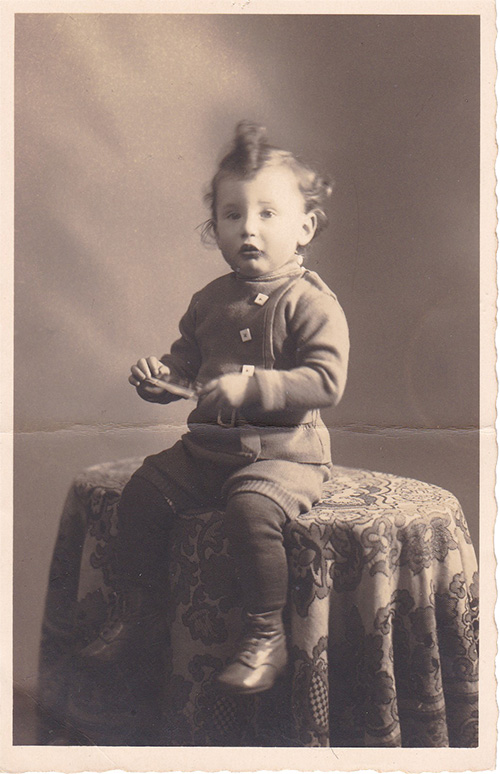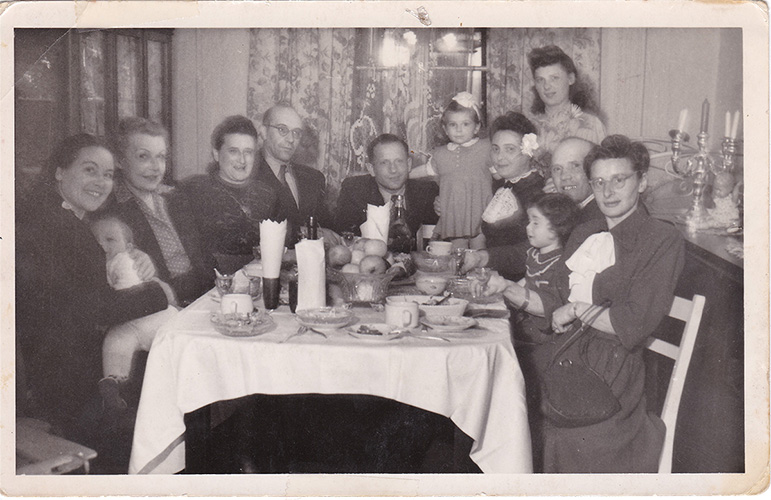Rosa Altmann Kimerling
Biography
Rosa Altmann was born in Vienna, Austria on February 5, 1926 to Nachman and Yenta Altmann. In September 1927, her sister Suzanne completed the family. They lived on am Tabor Street in the Viennese section of Leopoldstadt.
The family lived a religious, Jewish, Viennese, middle-class life. Yenta made sure that the family was very well-dressed by a professional seamstress and worried about feeding her family healthy food. She made lace tablecloths, and of course, noodles from scratch. They visited with family and friends, took family walks together on Shabbat, and went on country vacations with friends. Nachman was an accountant at a Vienna department store and a serious Torah scholar who studied as often as he could. He was instrumental in founding a school of Torah study for boys. Yenta was sometimes disappointed when he would rather study than go to the movies.
Rosa loved Vienna for its beauty, its parks, and its ice cream. Among Rosa’s fondest memories from the period before the annexation was walking to her paternal grandparents on Friday to make challah with her grandmother. She and her sister had been born in this very grandmother’s bed. She loved the long walks she and her father took on Shabbat, talking about everything. They gave her a love of walking for the rest of her life. Nachman made sure that the girls had afternoon Hebrew conversation lessons at the Hebrew Bible and Conversation School of the Jewish Community of Vienna, with the emphasis on modern Hebrew as it was spoken in the Holy Land.
The girls went to a public girls’ school. When prayers were said at school, instead of forming a cross with their fingers, the girls kept them straight. When students went for scheduled religious lessons, the Jewish students went to theirs.
Everything changed with the German annexation of Austria on March 12, 1938. Hitler Youth surrounded and attacked the girls’ school. Rosa remembered her mother fighting her way into the angry mob surrounding their school in order to carry the girls home safely. No one ever understood how Yenta made her way into the school and how she and the girls got out unharmed.
Rosa remembered seeing people shot on the street from her window. She spoke about how her father and other Jews were forced to clean the streets with toothbrushes. Nachman was forced to clean the railroad station. Jews were forced to the edge of the Danube River and thrown in and shot. Nachman was saved by a young non-Jewish man they knew who shouted to the crowd to put him back on his feet.
She remembered that they had an upstairs neighbor who had always spoken to them coolly. During this period, however, the neighbor made a point of being friendly, offering the girls magazines to read.
Their calm family life was gone. One of Nachman’s co-workers at the department store, an SS officer, warned Nachman to leave Vienna immediately. Nachman made his way to France. He received a visitor’s visa to the US with the help of his workplace and left France on the Queen Mary in June 1938.
Yenta’s parents had been living in the US since 1921, so she too applied for visas for her and the girls, hoping to meet up with Nachman once they arrived. In the meantime, the girls now attended a school for Jews. They lived in constant fear, never knowing who would come knocking at their door. One day they did come knocking and told them to get out of their apartment because it was “too nice for them.”
Yenta searched until she found an apartment that was “appropriate for Jews,” not too far away. Here they lived in crowded conditions with cousins who eventually emigrated on the Kindertransport to England. The cousins’ widowed mother was sent to the camps and never returned.
On Kristallnacht, November 9, 1938, the Jewish-owned stores were vandalized, and their synagogue, along with almost all the other synagogues of Vienna, was destroyed.
With new restrictions on food rations for Jews, twelve-year-old Rosa, blonde and hazel-eyed with no “Jewish signs,” was the one who was sent to the bakery to buy the bread. Yenta began sending packages of their possessions to her parents in the US with no return address. Some arrived, some didn’t. When Nazis eventually came to confiscate their valuables, the very feisty Yenta demanded a receipt. She never got one.
Finally, a visa came through for the girls, but not for their mother. The two girls set sail for New York from Cherbourg, France on March 25, 1939.
When Rosa and Suzanne got to New York, they lived with their grandparents in Brooklyn and learned English. Their father, who was still there on a visitor’s visa, was basically illegal, and the only work he could find was physical labor. Finally, in 1940, Yenta received a visa and was able to escape from Vienna.
Rosa was valedictorian of her class at Thomas Jefferson High School.
In late 1946, a cousin from Atlanta sent Gaston Kimerling from Birmingham to meet Rosa, in hopes of a match. It was a true whirlwind romance, and they married in February 1947. She was very proud to become a naturalized US citizen in 1949.
Rosa loved living in Birmingham. She was involved in the Birmingham Jewish community, leading study groups on Jewish subjects. Later she was in charge of the Cardiac Research Center at the UAB School of Medicine.
In 1983, Rosa and Gaston moved to Israel, a lifelong dream of Gaston’s.
Rosa continued to work and later to volunteer, making use of her considerable intellectual abilities. Although Rosa lived a fulfilling life in Israel, she never applied for Israeli citizenship because she was “so grateful that the United States took her in and saved her.”
Gaston Kimerling died in 1996 and Rosa Altmann Kimerling on November 28, 2016.
Photos & Documents
More Information
Suzanne Altmann Wagner, born September 1927
Gaston I. Kimerling
Married February 16, 1947 in Birmingham









